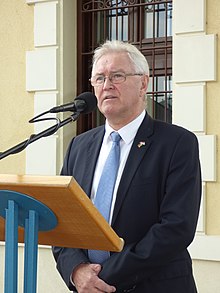Imre Ritter
Imre Ritter | |
|---|---|
 Imre Ritter at the inauguration of a plaque remembering on the expulsion of Germans in Solymár (2016) | |
| Member of the National Assembly | |
| Assumed office 8 May 2018 | |
| National Advocate of the German minority of Hungary | |
| In office 6 May 2014 – 7 May 2018 | |
| Deputy Chairman of the National Self-Government of Germans in Hungary (MNOÖ) | |
| In office 2011–2014 | |
| Personal details | |
| Born | 5 August 1952 Budaörs, Hungary |
| Political party | National Self-Government of Germans in Hungary |
| Other political affiliations | Fidesz |
| Spouse | Vera Ritter |
| Children |
|
| Alma mater | Karl Marx University of Economics Eötvös Loránd University |
| Profession | Mathematician Auditor Tax consultant Politician |
Imre Ritter (Template:Lang-hu, Template:Lang-de; born August 5, 1952 in Budaörs, Hungary) is a Hungarian German mathematician, auditor, tax consultant, politician, MP for the National Self-Government of Germans in Hungary (MNOÖ).[1] Between 2011 and 2014, he was the Vice-President of the National Self-Government of Germans in Hungary, and since 2014 the first national advocate of the German minority in the National Assembly.
Life
Ritter went to elementary school in his hometown, Budaörs, then graduated from the Fényes Elek Secondary School of Economics in Budapest. He was then admitted to the Karl Marx University of Economics where he graduated in 1976. He was employed at the Budapest Transport Company (BKV), where he initially worked as an economist and then became the economic deputy director. Meanwhile, he studied at the Eötvös Loránd University applied mathematics and earned his degree in 1982. In 1990 he left BKV when he founded his own accountancy and tax advisory office (the latter qualification was obtained in 1988). From 1996 on, the office started auditing. Ritter also has a tax expert qualification.[2]
After the Rendszerváltás, Ritter actively participated in the emerging national minority self-government. In 1994 he became a member of the first minority self-government in his hometown, Budaörs, and shortly afterward he was elected president. In 1998 he was elected President of the Financial Committee of the National Self-Government of Germans in Hungary (MNOÖ) and was re-elected in 2003 and 2007. In 2011 he was elected Vice President of the MNOÖ. At the Hungarian parliamentary election in 1998 as the candidate of the Nationality Forum he could not obtain a mandate. In 1998, he was granted a privileged mandate as an independent German minority candidate at the Budaörs representative body, in which he spent a cycle. In 2006, he became a member of the Budaörs representative body of Fidesz and KDNP, and in 2010 he candidated for the mayor of Budaörs. At the 2014 parliamentary election, he was the second runner in the German nationality list. Since the list did not get the sufficient number of votes and Ottó Heinek did not accept his mandate, Ritter became the first national advocate of the German minority in the Hungarian National Assembly. For this reason, he resigned from his municipal government roles.[2]
He was elected leader of the German nationality list at the 2018 parliamentary election where he received one seat in the National Assembly representing the National Self-Government of Germans in Hungary (MNOÖ).[1] He became the first German minority representative in Hungary since 1933.[3][4]
Personal life
He is married to Vera Ritter. They have five children – four daughters, Orsolya, Mónika, Mária, Annarose and a son, Gergely. His wife works as teacher in the Jakob Bleyer German Nationality Elementary School.[2]
He speaks Hungarian and German fluently and also has an English language exam of intermediate level.[2]
References
- ^ a b "Ritter Imre minden nemzetiség érdekét képviseli majd az Országgyűlésben".
- ^ a b c d Minalunk.hu. "Fidesz Budaörsi Szervezete – Minálunk.hu – Budaörs". www.minalunk.hu.
- ^ Harris, Chris (April 6, 2018). "Hungary's Crunch Election: Five Things We Learned". Euronews. Retrieved April 12, 2018.
- ^ "Macaristan'da 85 yıl sonra mecliste Alman azınlığı temsil edecek olan Imre Ritter kimdir?". 9 April 2018.
